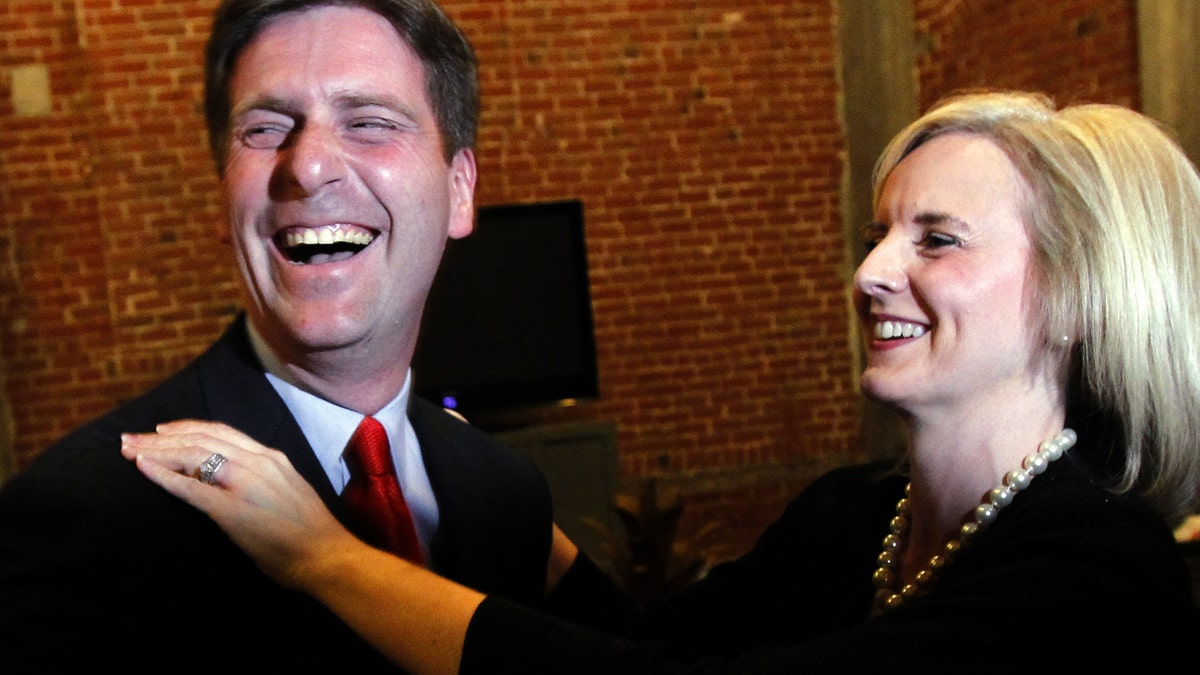
Democratic candidate for Phoenix mayor Greg Stanton, left, celebrates with his wife Nicole France Stanton after learning about positive early election results, Tuesday, Nov. 8, 2011, in Phoenix. Stanton defeated Republican Wes Gullett to become the new mayor of Phoenix. (AP Photo/Ross D. Franklin)
The recall election defeat of Republican legislator Russell Pearce, who authored Arizona's tough anti-immigration law, and the seating of Democratic mayors in Phoenix and Tucson has given the Democrats renewed hope for next year's state Senate and presidential elections in a state where the Latino vote weighs heavy.
Combined, the outcomes underscored the diversity of voters in what many view as a conservative state even though voters here are split nearly in thirds among Republicans, independents and Democrats.
I think that some on the East Coast don't put us there. But every indication is we are there. The Obama campaign has said Arizona is at the top of the places they are looking at to compete very hard.
The Democratic Party argued that Tuesday's recall of state Senate President Russell Pearce was evidence of a broader shift to the left that will reverberate in 2012.
"For the first time in 20 years, we will have Democratic mayors of Tucson and Phoenix," state Democratic Party Chairman Andrei Cherny wrote in an email to supporters. "And for the first time in American history, a state legislative leader - the most powerful politician in Arizona - was recalled from office. These are victories for all Arizonans - ones that six months ago would have seemed all but impossible."
"A year from now, when we are looking back on Election Day 2012, we will point to last night as where things turned around for our party and state," he added.
Republicans dismissed Tuesday's results as coming from an "abnormal election" funded by out-of-state interests upset by Arizona's 2010 enactment of the groundbreaking immigration enforcement law known as SB1070.
"They thought this proved a point. It didn't," said Arizona GOP chairman Tom Morrissey. "It will all be undone in the next election. It was a power grab by the left. They won a battle, they have not won the war by any means."
But the rhetoric, new polls and the emphasis being put on Arizona by the Democrats and President Barack Obama's campaign indicates that the state — which on the surface appears solidly red with its two longtime Republican U.S. Senators, a GOP near-sweep of statewide offices and one of the country's most conservative legislatures — is heading into the 2012 elections solidly purple.
In the 2008 presidential race, Arizona was a given for home-state candidate John McCain, the Republican nominee.
And while Republican Gov. Jan Brewer was an easy winner in 2010, Democrat Janet Napolitano twice ran gubernatorial races in the last decade.
"I think that some on the East Coast don't put us there," said Cherny. "But every indication is we are there. The Obama campaign has said Arizona is at the top of the places they are looking at to compete very hard."
In 2012, Obama spokeswoman Ofelia Casillas said, the state will play a "critical role" and has been among the battleground states where its grassroots movement, Organizing for America, has been active. The campaign has also recently hired a Mexican-American regional field director and a Mexican-American fellow who is focused on reaching out to the Latino community.
Those efforts may find fertile ground in a state where Hispanics make up nearly 30 percent of the population.
A recent Rocky Mountain Poll from October showed Obama either about even or apparently ahead of three Republican presidential contenders: Herman Cain, Mitt Romney and Rick Perry.
The same survey also found that only 38 percent of the state's voters call themselves conservative. Thirty-four percent consider themselves moderate while 28 percent call themselves liberal.
"The impression of Arizona as a majority conservative state is more a reflection of gerrymandering and the historically superior strength of conservative forces in getting their voters to the polls," the Behavior Research Center said of the ideological splits.
Indeed, neither party holds a majority of the state's voters. Republicans hold a slight lead with roughly 36 percent of registered voters while roughly 33 percent are independent and 31 percent are Democrats.
The Behavior Research Center pollsters said the recall of Pearce, whom they called "the most powerful conservative voice in state government," may be a "harbinger of what can happen when voters in the center organize to get out their vote and make their election preferences felt."
Organization and appealing to mainstream voters more interested in solving problems than championing extreme politics and hot-button issues like immigration are the focus of the Arizona Democratic party, Cherny said.
In that vein, their hopes in the state's 2012 race for U.S. Senate may have been bolstered last week when Richard Carmona officially entered the race for the seat now held by retiring Republican Jon Kyl. The former surgeon general under President George W. Bush was aggressively recruited by Democratic leaders who hope he will appeal to the state's moderate and independent voters.
Carmona describes himself as a fierce independent and notes that Republicans in the past had also recruited him to run for office. He'll face lesser-known Don Bivens, an attorney and former state party chairman, in the primary, while U.S. Rep. Jeff Flake and businessman Will Cardon will battle for the Republican nomination.
Morrissey, the state Republican chairman, said Tuesday's vote only provides his party's activists with an incentive to work harder. And there's reason for optimism, he said.
"In the wake of all this we still face the same problems: immigration, jobs, education, the economy. It all happens to be tied together," Morrissey said.
Based on reporting by the Associated Press.
Follow us on twitter.com/foxnewslatino
Like us at facebook.com/foxnewslatino
























